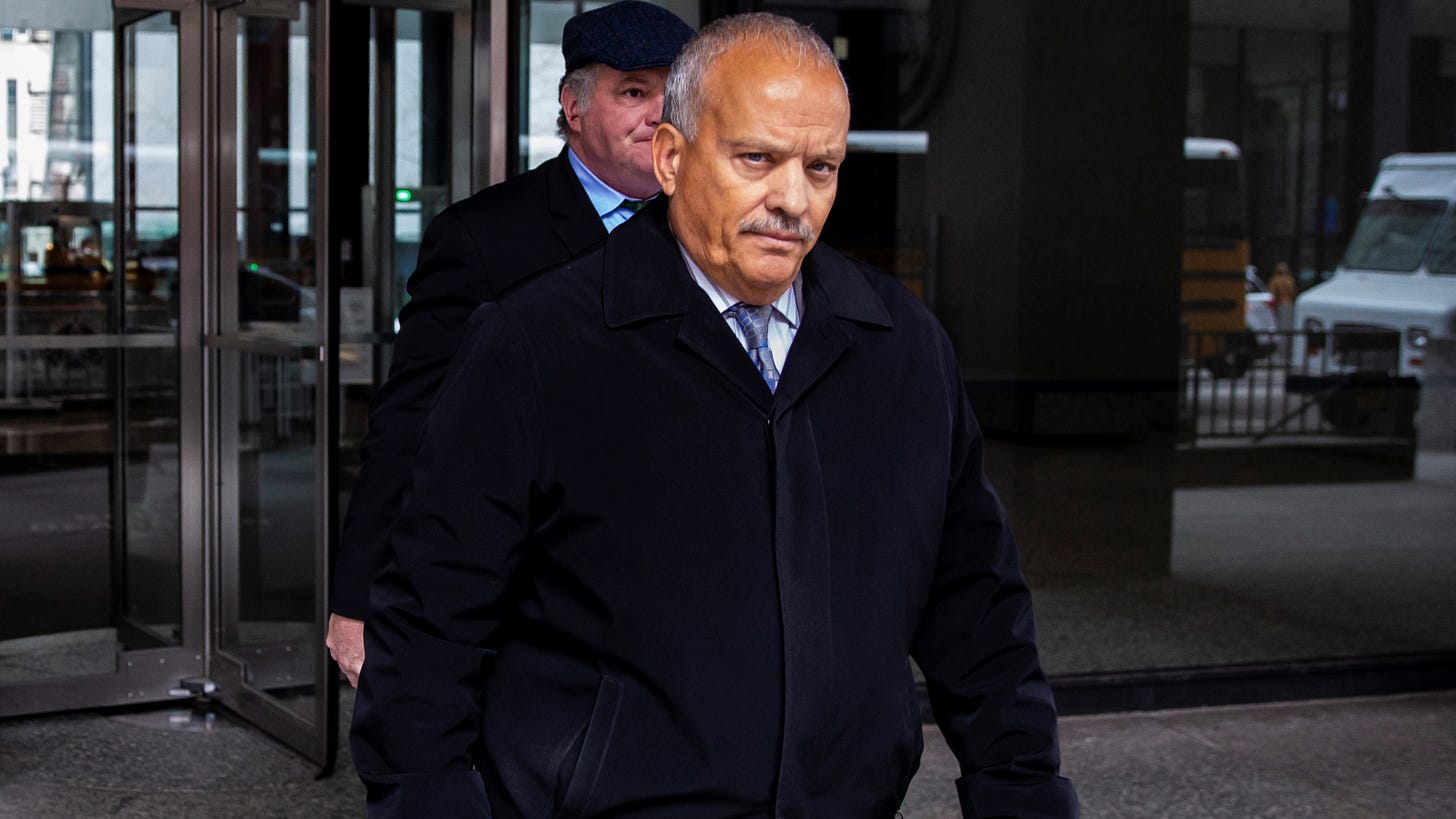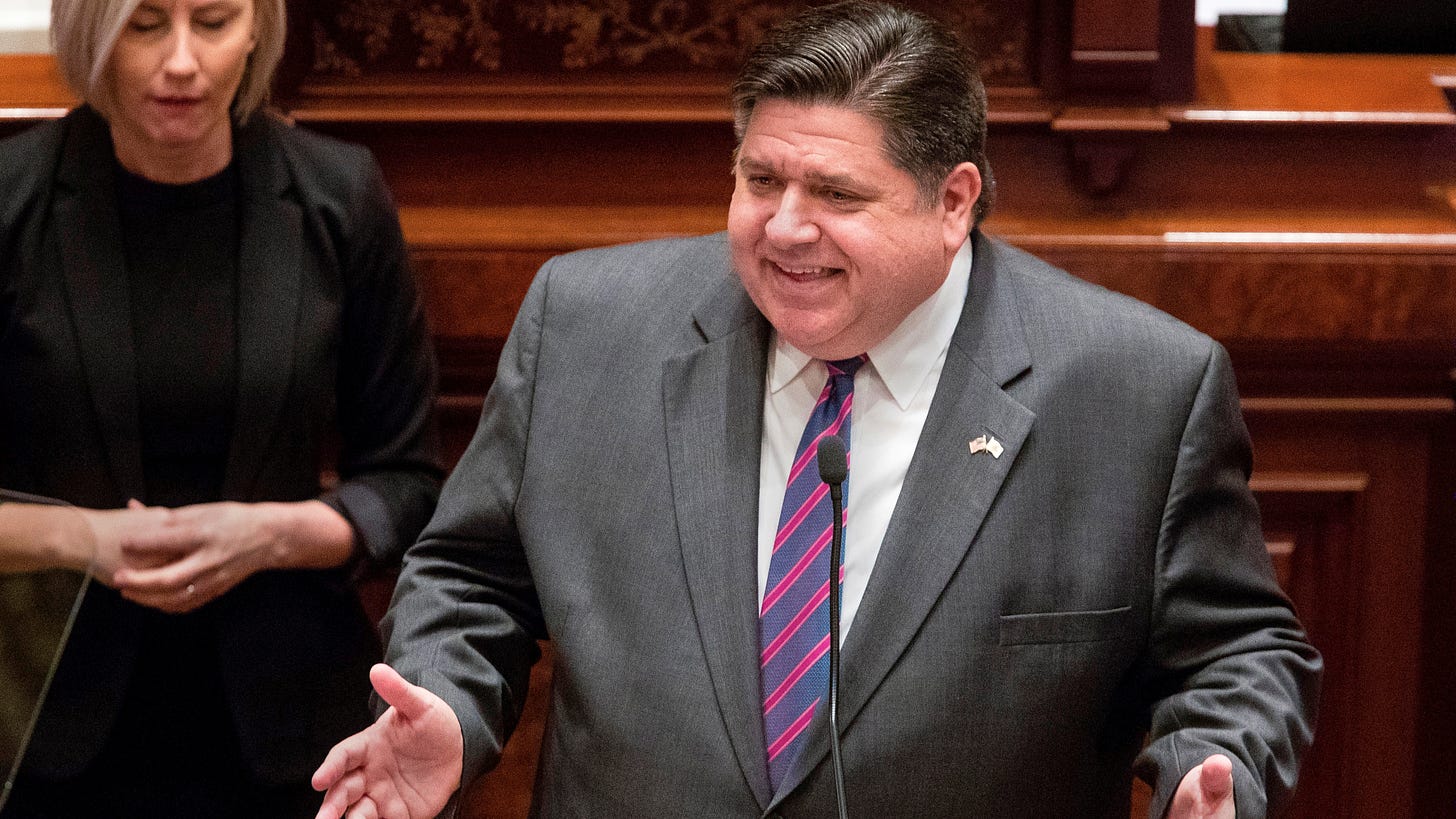THE ILLINOIZE: Monday Free for All
January 31, 2022
Good morning and happy Monday.
Today is the last day to take advantage of our $22 discount to kick off 2022. It’s just $53 for a full year subscription to our subscriber only content. That includes two exclusive newsletters each week, breaking news alerts, and previews of big stories and videos before we put it out to the public.
This is how we’re supporting our independent effort. We’re not beholden to a party or any ideological investor sugar daddy.
We hope you’ll join us. Just click below to sign up now.
As always, drop me a note at patrick@theillinoize.com with your questions and comments.
Let’s get to it.
YOUR MONDAY FREE FOR ALL
(note: we’re not responsible for paywalls and restrictions from other news outlets)
Sending former state Rep. Luis Arroyo to prison for corruption like ‘draining Lake Michigan with a spoon,’ say lawyers arguing for probation (Chicago Sun-Times)
Former state Rep. Luis Arroyo is asking for probation in his federal corruption case, arguing that imprisoning him would be “no more effective than draining Lake Michigan with a spoon” in curbing corruption.
“Mr. Arroyo is done with politics, and is leading a life away from the spotlight. He spends his days with his family and has learned his lesson,” his lawyers argued in a sentencing memo filed Saturday.
Sending Arroyo to prison wouldn’t have any effect on other politicians’ behavior, his lawyers argued.
Arroyo pleaded guilty last fall to bribery charges that stemmed from a wide-ranging federal public corruption probe in Illinois.
Former state Sen. Terry Link recorded Arroyo saying, “tell me what you need” during a 2019 meeting at a Highland Park restaurant and testified that Arroyo later gave him a check for $2,500 to support sweepstakes legislation, the Sun-Times previously revealed.
Link, who was wearing a wire for the FBI, denied being a cooperator in the case when asked by a reporter, but the latest court documents name him.
“Sen. Link testified that Mr. Arroyo spoke to him in May and July 2018 about sweepstakes, asking ‘are you okay with it,’” the filing states.
The memo goes on to say the two didn’t speak again until “Sen. Link was a cooperating witness who arranged meetings to discuss the issue and demand payments for his efforts, which occurred in a brief period beginning in August 2019.”
Nicole Budzinski, who served on Gov. J.B. Pritzker’s staff in spring 2019 and is running to represent Illinois’ 13th District in Congress, testified to a grand jury that Arroyo was a sweepstakes advocate and had sought a meeting with the governor — but never got one.
Budzinski said Arroyo could’ve been seeking a meeting about “a lot of different things.”
State Sen. Tony Muñoz testified Arroyo approached him in 2019 to “arrange a meeting,” according to the documents.
State Rep. Bob Rita testified that he and Arroyo discussed legislation about sweepstakes and that Arroyo advocated for the legislation at a meeting with house members. State Rep. Michael J. Zalewski testified Arroyo was “wishy washy” about sweepstakes in a conversation they had. Neither of the representatives said they knew Arroyo had a lobbying agreement.
Budzinski, Muñoz, Rita and Zalewski didn’t immediately respond to requests for comment Saturday.
Budzinski is, of course, running for Congress downstate in the new 13th district. So, you can expect a news release from DC Republicans tying her to corruption in 3…2…1…
But, isn’t the worst indictment of ethical problems in Springfield the allegation that putting a corrupt legislator in prison is just a drop in the bucket?
There’s currently no Legislative Inspector General, by the way.
Pritzker seeks to burnish Illinois' newly won fiscal reputation (Crain’s Chicago Business)
When Illinois Gov. J.B. Pritzker delivers his fiscal 2023 budget proposal next week, his aim will be to show taxpayers, investors and legislators that the state’s financial gains are here to stay.
Illinois received its first credit upgrades in two decades last year amid a rebound in tax revenues and billions of dollars in pandemic-era federal aid. The improved finances allowed officials to pay years of backlogged bills and better investment returns helped the state reduce its unfunded pension liability for the first time since 2017.
It’s been a dramatic reversal for the state with the lowest credit rating. At the end of 2020, Illinois risked a downgrade to junk-bond status after taking emergency loans from the Federal Reserve to allay revenue losses from the pandemic. The state had almost no rainy day fund, paid an ever-higher penalty to borrow in the $4 trillion municipal bond market and Pritzker’s plan to collect more taxes from the wealthy was rejected by voters.
“The state has done a lot in recent years to right its fiscal ship,” said Amanda Kass, associate director of the Government Finance Research Center at the University of Illinois in Chicago. “Is that a blip in a long-term trend or is this the start of an upward trajectory in the state’s finances?”
In recent campaign ads, Pritzker, a billionaire Democrat, presents himself as the financial conservator the state needs. He says he plans to keep working to responsibly manage the budget, reduce Illinois’s interest costs, further cut the bill backlog and earn more credit upgrades. His budget proposal, scheduled for Feb. 2, is expected to outline some of those efforts.
“What they’ve seen for three years is very responsible fiscal leadership,” Pritzker said in an interview earlier this month, referring to the state’s stakeholders.
For fiscal 2022, the state has forecast a surplus of $418 million, bigger than an earlier estimate, citing cost cuts, use of part of its more than $8 billion in American Rescue Plan Act money, and higher revenue from sales and income taxes. The state kept most spending unchanged, other than education and vital services, Pritzker said.
For fiscal 2023, Pritzker’s budget office in November projected a deficit of $406 million, smaller than previously forecast. The governor declined to comment on specifics on spending and revenue for fiscal 2023, which begins July 1, such as whether he plans to increase the rainy day fund contribution beyond the already proposed $300 million.
“The goal would be to keep spending below the level of natural growth that would occur in the budget in terms of revenue, so that we can continue to put together a surplus for the state,” he said.
Related: Lawmakers, governor return to Springfield this week (Capitol News Illinois)
This partial pension patch looks likely to be renewed (Crain’s)
Editorial: On pensions, it's two steps forward, one step back (Crain’s)
Democrats deserve credit for passing a balanced budget last spring. They also deserve credit for not pumping out all $8 billion of federal bailout money into the current budget to fund a bunch of pet programs.
The state has not done enough to tackle pensions, obviously, and the Unemployment Insurance Trust Fund, which pays out unemployment claims, is billions in the hole.
Some Democrats admit more progressive members of their caucuses will have to resist the urge to balloon spending this year. It will be interesting to see how the most progressive governor of our lifetimes handles the fiscal responsibility/social spending divide in Springfield.
Fritz Kaegi botched COVID tax relief (Chicago Sun-Times)
When the COVID-19 pandemic hit, Cook County Assessor Fritz Kaegi decided to give homeowners a break based on his office’s unusual effort to estimate pandemic-related job losses and use those calculations to lower property assessments.
It turned out to be a wild miscalculation that worked out well for some, including Mayor Lori Lightfoot. The property tax bill on her home in Logan Square fell after Kaegi cut her property assessment in the booming neighborhood by 11%, a Chicago Sun-Times analysis has found.
But it didn’t work out so well for homeowners in some parts of Cook County, like Greater Grand Crossing, the poor South Side neighborhood that Kaegi decided would likely face the same level of pandemic-related unemployment as Winnetka. Those South Side homeowners ended up seeing small increases in their taxes.
Unemployment projections aren’t the sort of math his agency ever did before. But Kaegi says he decided he needed to do something when it became clear within weeks of the March 2020 state-ordered shutdown in response to the pandemic that home values in Chicago and the suburbs were falling.
So that spring Kaegi had his staff recalculate the values placed by his agency on all 1.5 million homes in Cook County, cutting each of those assessments by a median of 10%.
That didn’t mean everyone would end up paying less in taxes. Government taxing bodies still needed the same money to operate. So the amount of property taxes collected countywide wouldn’t change.
But Kaegi’s move affected every tax bill, resulting in lower tax bills for some homeowners, higher ones for others — and higher tax bills for most commercial buildings even though businesses were hard-hit by the pandemic, too.
Kaegi says that’s because commercial properties hadn’t been paying enough property taxes — which fund schools, police and other government services — because they’d been under-assessed by predecessors holding his office.
The idea that small business owners aren’t paying enough in property taxes is absolutely laughable.
Four months after near-death COVID-19 battle, newlywed returns home to Dixon (Shaw Media)
When Rochelle native Carlie Hamburg, 21, got married in September, she didn’t realize weeks later she’d be fighting for her life against COVID-19 at Northwestern Medicine Kishwaukee Hospital in DeKalb.
Carlie, who is unvaccinated, said she believes she contracted the virus from a concert she went to in September.
“I hope somebody somewhere listens,” Hamburg said Thursday from Marionjoy Rehabilitation Hospital in Wheaton, where she spent her last night eagerly awaiting her homecoming.
Her ordeal lasted nearly four months among three hospitals. She was placed on a ventilator and a heart and lungs bypass machine. On Friday, accompanied by her 23-year-old husband Brandon, Carlie returned to their home in Dixon, 121 days after she was hospitalized. They took their first newlywed photo since the wedding with their dog, Bella.
“I’m not going to lie, I was one of those people that was like, ‘COVID’s political. It’s not that bad. It’s nothing. I’m not getting vaccinated. I won’t be a sheep,’” Hamburg said in recollection.
“I think, unfortunately, it’s something you have to go through to realize — which sucks,” Hamburg said. “But even some of our closer friends that have gotten it are still like, ‘I’m not getting vaccinated.’ I’m like, ‘You were so sick, complaining; why wouldn’t you?”
You can absolutely argue some people are overdoing their reactions to the ongoing pandemic, but there’s no way you can honestly argue that the vaccine isn’t keeping people alive. I’ve said 100 times by now that I’d rather have flu-like symptoms for a few days with a breakthrough case than winding up on a ventilator in the hospital.
SOME TOP LINKS FROM LAST WEEK
JOIN US












